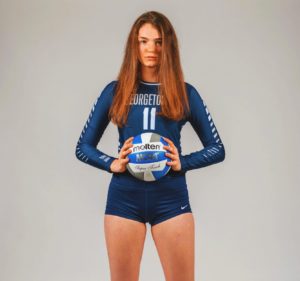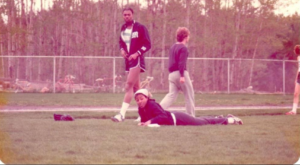An interview about navigating retirement with The Virago Project’s Co-Founder, Emily McGee Zaslawsky.
Emily, I was wondering if you’d be willing to tell me a bit about the role that sport has played in your life growing up, and how that may have changed at university/college?
Volleyball has been my entire life since I was 13. My club had all of my best friends there, and we would practice after school for four hours a day, four days a week, with tournaments every weekend. Then, our “off-season” was high school volleyball where I was still on a very competitive team who would regularly win state championships, practice just as long, and compete with many of the same athletes as on my club team. I knew the nuances of my teammates’ game, and we were a true team in every sense of the word. It was definitely an adjustment going to college with teammates I didn’t know, because it felt like all the upperclassmen were already friends, and I had a hard time “fitting in” and getting acclimated my freshman year. The goals in my youth sports were to win a state championship, win a national championship, and get a college scholarship. In college, I had to take a step back my freshman year and figure out how to adjust my goals and my expectations when winning a national championship wasn’t a realistic possibility for our team.
Whilst playing collegiate sport, would you define your relationship between yourself and your sport as a healthy one?
Not right away. My first year there was an adjustment period involving being away from home, getting to know my new teammates and coaches, and my role on the team, and I found myself really unhappy at times. After my freshman year, I felt like I started to have balance in my life for the first time, along with a better understanding of my spot on the team and frankly at the school. After growing up in such an intense youth sport environment, it was weird to almost let my foot off the gas and not have my entire-being be volleyball. I went from only having one week off the entire year, to a pretty traditional “off” season with minimal practices, and a summer that was pretty self-led. I eventually made some friends, went to parties, and worked various jobs during my collegiate career and started to establish “Emily the person” outside of volleyball. It was hard turning off the one-track mind I had entering college my freshman year, but ultimately it led to a much healthier experience for me.
Tell me about your retirement from sports. Retirement from competitive sport is a taxing process for any athlete both physically and also mentally. Let’s talk about the physical effects first.
My career ended when my 4 year eligibility ended at UNC. I decided not to continue playing in Europe because my senior year of college I had a herniated disc and a few bulging ones in my lower back which caused a significant amount of pain. I’m a competitor at heart so I pushed through the pain to give it my all one last season, and while I don’t regret it, I’d be lying if I don’t wonder occasionally if my annual back flare up would be here still if I didn’t slow down a bit. Other than my back, my body physically adjusted really well and has been overall much happier since I retired.
Aside from the physical side of retirement being a challenging experience, the mental side remains an equally demanding issue. When thinking about retiring from sports, my brain immediately jumps to feelings related to a loss of identity as a result of no longer being a high-performance athlete. Can you talk me through how your emotional mindset transitioned throughout the first couple of months of your retirement from competitive sport?
The mental changes were by far the toughest part, and I honestly wasn’t ready for it. I thought because I was injured I would be okay, and I wouldn’t miss playing. However, like you said, that loss of identity really hit me hard. Ever since I was a teenager, my best friends were wrapped up in my sport and the ones I had from home all went to play in colleges all over the country, and most of the friends I made at college moved away from UNC upon graduation, so I lost my previous teammates around the same time I lost my sport. My whole life I was always working towards the next goal which was not only my passion, but also a goal that had very measurable statistics and ways to measure my performance, and now I was just stuck in a corporate job that I didn’t really care about, asking myself “is this it?” While I started to find other hobbies and interests in college, it was far too little too late, and I didn’t have a good grasp of what made me happy, or the person I would be without volleyball and the accolades that went along with it.
I’ve found that the media and sports industry often reinforce the idea that the term ‘athlete’ is reserved primarily for those competing in high-level competitive sports. Do you think that this could be a potentially damaging definition, causing harm to those transitioning out of performance by destabilising their sense of identity? What does the word athlete mean to you and how has that changed over time?
I love this question, first, let’s talk about identities for a bit. There are so many identities that will come and go in a person’s life, but others that remain constant. For example, I will always consider myself a daughter, a sister, and as of last year, a mother. There are some temporary roles I’ve played: a fiance, a teammate, and a student that only last for certain seasons of life. So, to answer the question about how I feel about which of those categories “athlete” falls into, I think it can go in both depending on the person and their life experiences. If you played t-ball, walk regularly, jump rope- yep, you’re an athlete. However, for these “non-elite” athletes, I’m not sure how large the athlete identity is for them in those situations. For me, sport was such a ginormous part of my life and essentially my entire identity for about half of it, I consider myself a “retired athlete” or “former athlete” because it was such a large part of my identity that was suddenly lost. I definitely did go through a grieving process upon my retirement, and if someone would have told me “well you’ll always be an athlete,” I’d roll my eyes at them so hard because the truth is – it is different. Is this because the media and sport industry puts elite athletes on such a high pedestal? That may be part of it, but I think maybe the larger contributing factor, at least for me, was that I didn’t establish other identities to replace the huge hole I faced. I think if I was still able to identify as an athlete, I wouldn’t have had such a hard time, so for anyone out there who was able to keep that identity and forever keeps the athlete identity- more power to them, and I definitely don’t think that’s incorrect.
Somewhere along your retirement journey, you discovered The Virago Project and have since been heavily involved as Co-Founder and Chief Operating Officer. How has being involved in this project aided you in your recovery?
After graduation, I started writing some blogs under the name “Retired Athlete Problems” and was shocked by the number of prior teammates and strangers that reached out to me with messages saying that they could relate. I didn’t realize at the time that this was a shared experience, and I was so glad that I was able to reach so many people. Then, life happened and my blogs slowly dwindled off. A few years ago I met with Taylor (our founder) in a Panera where we talked for a few hours about this idea, and told her my experience and told her how awesome of an idea The Virago Project was to me. Then, in May 2020, I gave birth to my daughter, Juliette, in the middle of a global pandemic where my job was client-facing in a large city with high Covid case numbers. My husband and I made the decision for me to not return to my job, but I knew after how hard the transition was from retiring from sport, I wasn’t entirely ready to hang up my career identity and reached out to Taylor to see if she could use some help in this endeavor that we had talked about 2 years prior. It’s been so therapeutic working on something I’m so passionate about and being able to share stories of athletes along with my own to help other women athletes.
What advice would give to athletes who are currently transitioning out of competitive sports and potentially struggling to adjust?
Three things I’d like to say:
- Retiring from sport is really tough. You’ve been laser-focused on something you’ve had tons of support around. You’ve had coaches preparing you for each physical opponent you’ll face, academic advisers and tutors preparing you for classwork, and job services preparing you to find the right career for you, but this opponent is one that I was never prepared for. I think if I would have had someone talk to me about how tough it was for them, and what helped them get through that time I would have been much better off, and that’s why preparing for retirement and the loss of identity is one of the Team Talk Workshops Taylor and I give to collegiate athletes now.
- You are not alone. There is a grieving process that’s associated with retirement for many athletes, and I just want everyone to know The Virago Project’s DMs are always open and don’t be afraid to talk to a therapist or counselor about what you’re feeling for some strategies.
- It gets better. Once you have some time to establish new identities, it’s much easier to come to terms with that area of your life being in the past. Now that I’m ten years removed from collegiate athletics, I see it a lot like Kindergarten. I’m sure it was nice having that shorter day, snacks, and naps, but I wouldn’t want to go back to that area of my life. I can appreciate and remember the good (and bad) times and embrace that chapter of my life was necessary for my current life now. This transition period of your life is called a transition for a reason, it’s temporary and is preparing you for bigger and better things.



